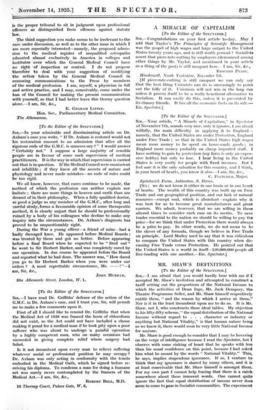[To the Editor of the SPECTATOR.] Sm,—Your article, "A Miracle
of Capitalism," in Spectator of November 7th, sounds very nice, only it ignores, I am afraid wilfully, the main difficulty in applying it to England— namely, that the United States are under Protection, England under Free Trade ; so that in the United States high wages mean more money to be spent on home-made goods ; in England more money probably on cheap imported stuff. I have nothing to gain by protection (my farm is only an expen- sive hobby) but only to lose. I hear living in the United States is very costly for people with 'fixed incomes. But I feel sure it is the only salvation for this country, and I think, in your heart of hearts, you know it also.-1 am. Sir. ate..
C. PLF.TCHER, Major. Spitchwick. Farm, Ashburton, S. Devon.
[No ; we do not know it either in our brain or in our heart of hearts. The wealth of this country was built up on Free Trade and our geographical position, and our lack of natural resources—except coal, which is abundant--explain why it was best for us to become great manufacturers and great carriers. We admit, however, that we are willing in these altered times to consider each case on its merits. To save trades essential to the nation we should be willing to pay the price—for we think that under Protection there would always be a price to pay. In other words, we do not mean to be the slaves of any formula, though we believe in Free Trade on principle. Lord Morley used to say that it was ridiculous to compare the United States with this country when dis- cussing Free Trade versus Protection. He pointed out that the United States is a world in itself-120.000,000 people all free-trading with one another.—En. Spectator.]


























































 Previous page
Previous page